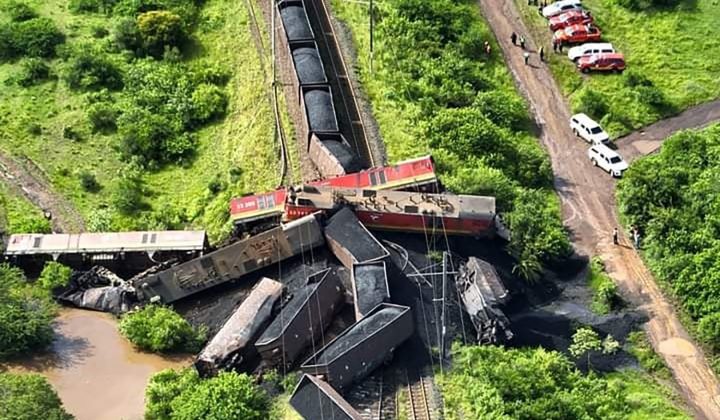DAMAGE ASSESSMENT
SA’s coal firms expect ‘limited impact’ on export after Transnet train collision and derailment

While the collision of two trains on a busy and crucial rail line in Richards Bay was seen as a setback for South Africa’s coal export activity, mining companies do not expect a big impact on their operations. However, it is still early days as most mining operations have only recently resumed following the December shutdown.
The only silver lining in the latest disruption to Transnet’s freight rail operations — arising from two trains colliding on a crucial coal export line in recent days — is that mining companies do not expect a major impact on their export activity.
For at least five days (from 14 January to 18 January), Transnet’s coal export line to Richards Bay in KwaZulu-Natal, which connects to South Africa’s main coal export terminal, was closed and out of service.
The collision of two trains at the Elubana Rail Corridor, outside Richards Bay, blocked tracks on the coal line, with export activity suspended while railway tracks were cleared of debris.
This was the latest blow for the mining industry, which relies on the line to rail coal to markets but has struggled to do so in recent years because of mismanagement by Transnet officials, years of underinvestment in maintenance and upgrades, and theft and vandalism.
By Thursday, 18 January, Transnet had managed to resume partial service on the line, declaring it “safe for the passage of trains”. And “weather permitting [heavy rain conditions in recent days]”, Transnet said the only remaining disrupted line was expected to resume operations at the weekend, with full services returning by Monday, 22 January.
Transnet has yet to provide details about the cause of the train collision and subsequent derailment. It only said that an investigation was “under way to determine the cause of the accident”. However, human error and a failure in Transnet’s systems to track the movement of incoming trains on the line are suspected to be the cause.
Read more in Daily Maverick: Blow for SA’s coal exports as crucial Transnet rail line faces major disruptions
The good news is that mining companies (coal exporters) seem to have emerged unscathed from the latest disruption to Transnet’s rail network.
Thungela Resources, a major coal miner spun off from Anglo American, told Daily Maverick that the collision and resultant derailment was “expected to have limited impact” on its operations. Exxaro, another major coal exporter, expressed the same sentiment to Reuters. Both companies remain in regular contact with Transnet. Glencore South Africa declined to comment.
Mining companies may not be seeing a big impact from the coal line disruptions because the mining industry has only recently resumed operations after the usual December holiday season shutdown. The mining industry has also become accustomed to Transnet’s inefficiencies and finding ways around them.
Some mining companies, including Thungela and Kumba Iron Ore, have been forced to cut their production volumes of coal and iron ore to match or accommodate Transnet’s declining capacity to haul commodities to ports, also operated by Transnet. Companies are moving coal to ports via road using trucks, which is more expensive and less environmentally friendly than rail.
The dysfunction at Transnet has resulted in the tonnage of coal moved on the coal rail line to the Richards Bay Coal Terminal declining since 2020 — failing to peak above 60 million tonnes. The numbers for 2023 are set for a steeper decline, with data on the tonnage of moved coal for the entire year expected on 25 January from the Richards Bay Coal Terminal.
The terminal is a coal handling facility owned by 13 mining companies and has a capacity for 91 million tonnes of coal transported by rail every year. However, it now handles about 50 million tonnes, with half transported via road. DM

















 Become an Insider
Become an Insider
Of course they will use, and further stuff up, our roads. To the benefit of the Freight Transport companies – many of whom have political connections. So sad.